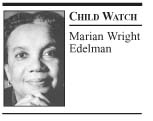 The increasing criminalization of children has become a major crisis. Children are being suspended and expelled from school and incarcerated in the juvenile and adult justice systems at alarming rates and at younger and younger ages.
The increasing criminalization of children has become a major crisis. Children are being suspended and expelled from school and incarcerated in the juvenile and adult justice systems at alarming rates and at younger and younger ages.
This increased incarceration is not due to an increase in serious delinquent or violent criminal behavior by young people. Juvenile arrests for violent crimes grew rapidly in the late 1980s and peaked in 1994, but then began falling.
Between 1994 and 2003, the juvenile arrest rate for violent offenses — murder, forcible rape, robbery and aggravated assault — fell 48 percent to its lowest level since 1980. So if actual crime is not the cause for the rise in incarceration rates, what is?
One piece of the puzzle is the rise of "zero tolerance" policies in schools. Schools began adopting these policies in the late 1980s, taking the term from the war on drugs. These policies hit the national level when President Bill Clinton signed the Gun-Free Schools Act of 1994, requiring a one-calendar-year expulsion for possession of a firearm and referral of law-violating students to the juvenile or criminal justice systems.
Most states and local school districts responded to the new law by broadening the mandate of zero tolerance beyond the federal mandate of weapons to include drugs, alcohol, fighting, threats or swearing. Many school boards continue to toughen their policies, experimenting with permanent expulsion for certain offenses. Others have begun to apply suspensions and expulsions to behavior that occurs outside of school.
While zero tolerance once applied to serious offenses involving safety, it is now an overarching and catch-all disciplinary approach for real, perceived and imaginary weapons and "misbehavior" that is defined by highly subjective terms like "disruption" and "disrespect." Aspirin, Certs and Midol are considered drugs. Paper clips, nail files, scissors and spitballs are considered weapons.
Punishment through exclusion is the overwhelming response. From 1974 to 2000, the number of students suspended from school increased from 1.7 million each year to 3.1 million. While zero tolerance has a place as a response to truly dangerous behavior, children should not be put out of school for any reason other than posing a real threat to themselves or others.
Another disturbing piece of the increased criminalization of children is the growing numbers of children sent into the adult criminal justice system. Approximately 250,000 teens under 18 enter the adult criminal justice system every year. More than half have been charged with nonviolent drug or property offenses.
The idea of youth serving "adult time for adult crime" grew in popularity in response to a sharp increase in drug and firearms violations. But the vast majority of teens tried and sentenced in adult court are not the serious, violent, chronic offenders.
Another huge factor in the increased criminalization of children stems from untreated mental health problems among children. Seventy-five percent of children in the juvenile justice system have mental health problems.
Finally, a key piece of the increase stems from the disparate treatment of Black and Brown children in the juvenile and criminal justice systems. Minority youth make up 34 percent of the adolescent population and 62 percent of juveniles confined to public facilities. In 1999, Blacks outnumbered Whites nearly 2-to-1 in the number of youth under 18 admitted to adult state prisons. For drug charges, the ratio was more than 8-to-1. A Black youth is 48 times more likely than a White youth to be incarcerated for comparable drug offenses.
The road that has been taking more and more of our children to prison and away from their homes and schools and communities and off the path to college and productive futures is long and twisted. But we don't have to keep allowing our children to be led astray.
It's time for caring adults to stand up and demand we change course.
Marian Wright Edelman is founder and president of the Children's Defense Fund.






















































































































































































































































































































